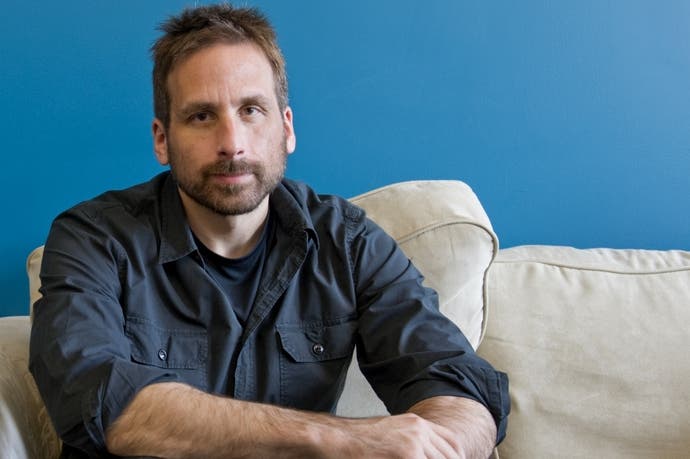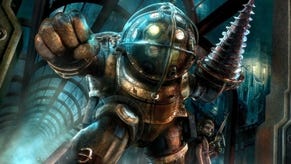Would the real Ken Levine kindly stand up?
From the archive: BioShock Infinite's creative director talks about games, politics and throwing himself on the fire.
Every so often, we reach back into the Eurogamer archive for a feature you may have missed or might enjoy again. This weekend, following the news of Irrational Games winding down, we rewind to early last year when Rich Stanton profiled BioShock's Big Daddy, Ken Levine.
To reach the Boston HQ of Irrational Games, you walk from a subway station through a small park. At the far end is a bronze statue of John Adams, one of America's founding fathers, and halfway to it you pass a small Vietnam memorial. The juxtaposition catches something permanent in America's character: the intellectual and humanistic vision of the ideals it was born with, matched forever to enormous, bloody folly. It seems an apposite setting for Irrational Games, the developer of BioShock Infinite, to create Columbia.
You wouldn't know where the studio is - after BioShock's success, so many fans were pestering for studio tours and keepsakes that the name was taken off the building's front. Even inside there's no hint of the wonders behind these walls - until you walk through a door and into a 'lifesize' Big Daddy. From one to another, I'm soon waiting in a room for Ken Levine; co-founder of Irrational Games, creator of BioShock, and creative director of BioShock Infinite. The most ridiculous gimmick in the world rests on the table - a Magic 8-Ball, in the shape of a D-20 die. Is this geek chic? I shake it up: "Run Away." Levine enters.
Some interviews make Levine seem like a ginger Tom Cruise, while many just awe at his intellect, so to be clear, he's one of the healthiest-looking 46-year-olds I've met, with an eloquence about and understanding of video games that few developers can match. He's clearly got a real engine too, filled with nervous energy, tapping away when confined to a chair or walking in a slight hurry. No 'off' switch. His eyes light up when we're talking games, his hands wring when talking crunch, and to steal one of Levine's favourite terms, he's a complex character.
Perhaps that why Levine inspires extreme reactions - whether that's deferential paeans or the Twitter vitriol he bats away with good humour. "Whenever you become a semi-public figure you sort of realise people, whether they're overly deferential or overly hostile, aren't actually reacting to you or to the person you are," says Levine. "They're reacting to your body of work and your public persona."
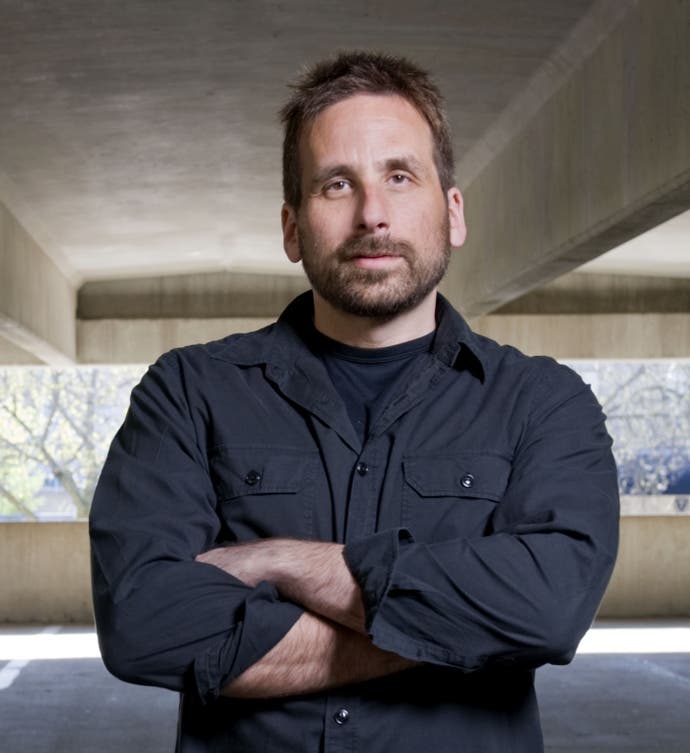
Which would be? "I think it varies - I mean, some people it's 'that jerk Levine', and some people I guess that persona is he's a talented game developer who's tried to do something different. It's hard to say, because the person who would understand it least is me, right? How could I have any perspective on that?"
This is the first time Ken Levine flips a question around, but not the last. Turning the tables is one of the distinctive movements in Levine's conversation, which is careful and deep thought occasionally marshalled by a few pet phrases ("there's no value in enemies"), and filled with irreconcilable details. There's a tiny dash of condescension in the way Levine talks about being a gamer with catholic tastes, then later circles back to explain he means that with a small 'c', but then seconds afterwards he's chuckling amiably about getting old: "Old-er, you mean." You never quite know where you are, especially when he throws curveballs like the third-person: "I'm just speaking for Ken, not anyone else." But you'd forgive Ken most anything.
I've been playing BioShock Infinite, so I wade in with something that bothers me about leading man Booker. He's a character that has serious psychological issues relating to the Wounded Knee massacre and yet, by the game's end, will probably have topped the bodycount of that entire event. "Look," says Levine. "You're tuning into an inherent tension, and I call it the 'beg the question' tension."
"When you're making Doom, and there's no intention to make anything but a fantastical OTT environment - that's not a criticism - you don't worry about that because there's nothing there for it to fight against. Once you start getting characters like Elizabeth, with Booker's violence the first time she sees it she reacts to it. So you're stuck as a writer and there's no excuse here, there's no - I'm being honest, portraying my struggles as a writer, if she didn't react to that scene you'd be like, 'Alright, well you rolled with that pretty easily!'"
As it is, Elizabeth is pretty horrified the first time she sees Booker in action - though of course she soon enough reconciles herself to it. "But if she reacts to it realistically," says Levine, "the reaction actually would probably be so long-lasting and so profound that the game would come to a screeching halt. So you try to walk this fine line, and movies do it too where you have a Die Hard movie - the guy's a mass mass mass murderer, and he finishes up and reunites with his wife and they share a few jokes. He would have PTSD for the rest of his life! But he goes along with it like there's a problem with the plumbing in his house and is all 'f***ing plumbing!' There is an aspect with the suspension of disbelief, you can make the issues less abstract like with Elizabeth's dialogue... But I don't have all the answers to that question, and it's something I struggle with all the time."
The 'beg the question' tension begs its own question - how does it feel to not have all the answers in charge of a project on this scale, where there's no safety net for failure? "This whole project is us coming to grips with fear," says Levine. "In some ways System Shock 2 is more similar to BioShock than BioShock is to Infinite, in the sense that the first two both had silent protagonists, the humans behind glass essentially, people talking over radios and giving you missions. One by one we started tossing those things away, and the reason we were so nervous about that is that all those things make your life so much easier. What happens if a player starts shooting? You start thinking do the cops come, when do they come, does the whole level clear out? Because that might be no fun either, so what's the right amount of the level to clear out so it feels like the player's made an impact but it doesn't ruin every other interactive experience in the level? Let alone Elizabeth, I mean Jesus Christ."
Levine collects his thoughts for a split-second. You could not visit Irrational Games without coming away clear about Elizabeth; she has been one monumental heave for this studio, and her components are pure blood, sweat and tears. One of BioShock Infinite's prototypes had a mute companion, and the inevitable switch from this to a speaking part was the point of no return.
"Slowly you start coming up, you put one foot on the dock first, you get comfortable then you might bring up the other foot - you keep doing these things slowly and you know, Ì think deep down there's a voice telling you in those periods that what you're doing is not gonna be enough, and you want to believe it because you're so nervous about what the implications are if you don't. What it meant is that if Elizabeth talks and Booker talks then my script for one level - that chapter after they first meet is longer than the entire BioShock script. And that was the first draft! There was so much writing and so much recording, and all that stuff just got so complicated."
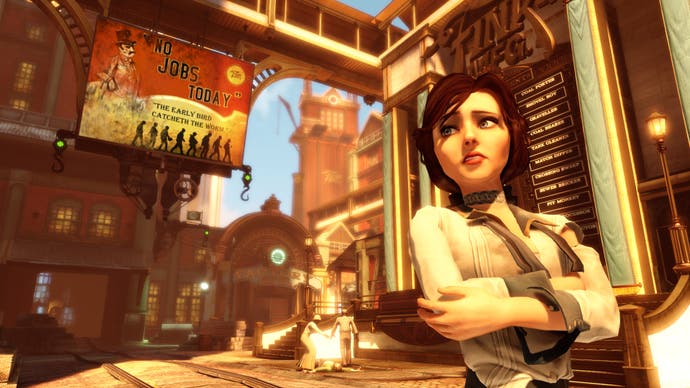
While talking about Elizabeth we move briefly onto one of the other ladies in Levine's life, though rather more of a background presence. With hindsight Ayn Rand seems like an extraordinarily timely subject - in the sense that her name has become a rallying flag for elements of right-wing America, almost to the point of caricature. "A lot of people point out that Rand took government money you know, and to me that's what makes for interesting people, interesting characters. Like Curt Schilling, who supported Palin and McCain and Romney, very anti-government, and yet worked with the government to make a big games studio and left them with a rather large bill - so you have these sort of living contradictions and for me they're the interesting ones, that's what Andrew Ryan is right?"
Right. But what's cool about BioShock is that it uses interaction to make a critique - or present a situation, if you prefer - of an idea that depends for its power on never being touched. Atlas Shrugged is social philosophy, and a weakness particular to this genre is that every person behaves as the philosopher-author believes they should. "Exactly. There are these ideals, and that's not just a left-wing or a right-wing thing but both - and I think that to me is what propaganda is, right, the difference between propaganda and thought. Propaganda shields ideas from danger, and I think I'd rather expose ideas to danger. I think that's what I like to make in these games, is to take ideas and say, well, let's see what happens when these aren't protected."
Levine and Irrational in general are keen not to ascribe meaning to the games' ideas - god forbid - and insist it's all up to individual players. I understand where that's coming from, but Infinite also seems a much richer space for real-world parallels than its predecessor. More than anything, it's a game about a seceded American state ruled by religious fundamentalists, created in a modern America where religion stills play a major role in social politics - abortion, evolution, gay rights, take your pick. "I think it comes and goes in waves," says Levine. "You had it as a much more powerful force politically a few years ago, and certainly from the time of Reagan I think it's waned."
"Propaganda shields ideas from danger, and I think I'd rather expose ideas to danger. I think that's what I like to make in these games, is to take ideas and say, well, let's see what happens when these aren't protected."
Yet the US passion for God is more enduring than that - it's as American as apple pie. And surely these waves, these cycles of awakening and fervour, must make an impression on a good East Coast liberal? "[Martin Luther] King said, I'm kinda paraphrasing here, that the arc of history curves towards the good," says Levine. "Science has a lot of things in its corner that are towards the good - evolution in this country is from an empirical standpoint difficult to argue with. The thing about science is that, unlike religion, it opens itself up to fallibility - it says well we could be wrong. It's designed to be wrong and testable and that's what makes it so powerful - the problem is that when there's any hole in a theory people do this thing called God in the Gaps. Which is that any time there's a gap you plug in what you believe, as if that... Well, two problems there. One is that people's beliefs are different, and two is that there's no evidence there so the holes still need filling."
God in the Gaps gets to the real heart of this - an idea summed up beautifully by none other than Benjamin Franklin: "That people believe they are right is no proof that they are." Viewed like this the BioShock games seem less about Rand and religion, the ideas themselves, than the confidence of their espousers. "I think in these games we deal with certainty a lot," says Levine. "The thing Ryan and Comstock [leader of The Founders in Infinite] have in common is their absolute certainty. As different as they are philosophically, night and day - one is an atheist capitalist empiricist, the other is nationalist and religious - they're so similar in the sense that they have certainty. I think that once you start having certainty, once you think you have infallibility, I think that's when things get really dangerous."
Why make games like this? Irrational and Levine have worked in other genres, perhaps most notably with Freedom Force, but the oeuvre is particularly weighted towards narrative-driven FPS games. "Look, there's no book I read somewhere that said, 'The way you're going to be successful is to make these games in which you embrace narrative heavily but not cut-scenes.' That was a choice that at some point I made - that the company made that, that that would be sort of our identity, a part of our identity, and I still don't actually know - maybe we would've been more successful if we hadn't bothered with that. I thought it was important, I think it's important for games as a gamer, and so I figured when I was working on something I might as well be working on something important for games - to push on narrative, but push on it in a way that's interactive as possible."
Which makes you think about pushing beyond Infinite. Is the future still, for Levine and Irrational at least, a narrative one? What about the shooter side, which may offer bankability but severely limits the types of games and concept you can work with? Levine pauses. "I like making... to me the FP is more important than the S, right? The first-person is very powerful. It is at the end of the day where interactive experiences, where the ultimate goals, lie, because that's what our experience is."
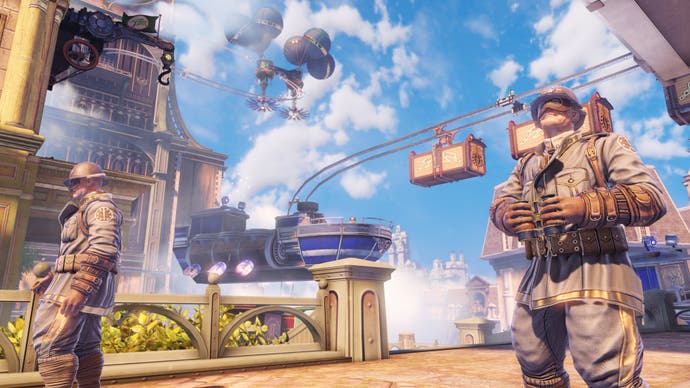
"And it allows us, in the kind of detail we put in the world, to get close to it in a way you can't otherwise and most importantly it's not a 'him', it's a 'you'. Booker is not forming a relationship with Elizabeth, some weird hybrid of you and Booker is forming a relationship. That's incredibly powerful. If Infinite was third-person Elizabeth would not be the same. The shooter part is more tricky because like you say it is kind of an odd thing, where all of a sudden all this combat's going on. I think of it sort of like musicals, you know - like you have this story and then all of a sudden everyone bursts out into song."
I had the opportunity to play through a good chunk of Infinite before meeting Levine and, touch wood, it looks like it could be a corker. But even from the outside it's clear games like this don't come easy. It's no secret that much talent has left Irrational in recent times, with something of a minor exodus in autumn 2012. Who knows what went on behind closed doors, but Irrational's style of working can't be easy at times; constant iteration and scrapping of earlier work, basically, and sometimes huge amounts of it.
Then there are the hours. You need only look at Levine's Twitter feed in recent months to see that Irrational has also been crunching to complete the game - that is, working every hour god sends. Can you make a game without crunch? "Yeah you could, absolutely. I don't think it's unique to the games industry in the sense that if you work in theatre, you work in film, that's exactly what it is - they're doing 12 to 14 hour days, but it's for a period of time."
That Levine admits crunch is avoidable nevertheless leads to an overwhelming question - why not with Infinite? "Crunch shows the difficulty of planning. But even so if I was working on a game, let's say you had planned it all perfectly, and it was two months before it was coming out. Personally? I know that if I don't work on it, if I'm not spending time on it, it doesn't go in the game. And I'm gonna look back on that - I look back on every single game I've ever worked on - and I think wow do I wish I'd spent more time or less on that game? And I can tell you in every single case it's more - and I'm just speaking for Ken, not for anybody else.
"I know, I can tell you what this game would be like if we - just do the math, if we'd worked less on the game, it would be that much less good. I throw myself on the fire here as much as anybody, and it really is to some degree that if I'm going to spend my life on something that makes a better game for the gamer, then I'm gonna do that. Because I want to be proud of it. I want to be proud of it."
I'll call that dedication, because that's what it is, but it's hard to ignore the obsession at the edges. Levine is obviously a driven man, with an intensity to match his intelligence, and a side effect of that combination is being an obvious workaholic. In fact, I wonder whether that's an understatement. Levine talking about throwing himself on the fire is an uncomfortably close reminder of Dr David Doak's damning summation of how the industry treats developers: "It's just this big furnace that burns people." The question of whether that human cost is worth it, even for something like Infinite, bothers me.
"It bothers me, yeah, it does bother me for myself - because there's a cost," says Levine. "Absolutely there's a cost. How could there not be? Everything in life has a cost and a reward. I think Irrational is not a place where... There are plenty of companies that churn out products. They turn out products that take minimal risks, they turn out products that are good, and there are plenty of products that can do things by a formula every year, and they know exactly how to do it, and they've got really good at it. Boy, I wish I had one of those f***ing formulas but I don't - BioShock Infinite is not a formula game."
"I wish it was simpler," ends Levine, "but I'm not going to kid you - it's not awesome, it's not like people love seeing their families less often, or that that doesn't cause problems. It causes problems for me, it causes problems for everyone. My wife when she married me knew who I was, and said that, 'As much as I hate being apart from you, I understand that if you didn't do that, it's a different person from the one I married.' It's not for everybody."
With that our time is up, and after a few pleasant words Levine is off - driving out and forwards, onto the next thing. His closing remarks are a sobering reminder of the price that developers at the sharp end of the industry pay in order to create exceptional games. But what can ever be done about that? The brightest stars burn fiercest, always, and Ken Levine is one of those.
The price of creating a game like Infinite is you pay with a piece of yourself. I tidy away my stuff, notice that Magic D20, and give it a final shake on the way out. Is there another way? "No (Home Rules)" stares back.
This interview is based on a trip to Irrational's offices in Boston. Irrational paid for travel and accommodation.
